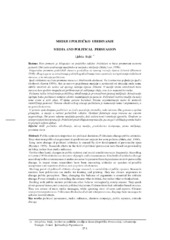Mediji i političko ubeđivanje
Конференцијски прилог (Објављена верзија)
Метаподаци
Приказ свих података о документуАпстракт
Public opinion is important for political decisions. Politicians change public attitudes. They often turn public disagreement to predominant support for some policies (Mutz, etal. 1996).
Long term change of political attitudes is caused by slow development of personality types (Riesman 1950). Research efforts in the field of political persuasion were based on personality stability, rather than media influence.
On the other hand, changes in public opinion and social conditions occur frequently. According to Lewin (1936) attitudes are function of people and circumstances. If individual attitudes change according to the circumstances it makes no sense to perceive their dependance on slow personality change. In recent times researchers have been measuring attitudes as specters of possible acceptance and rejection of ideas, not as points of estimates.
Starting point of political attitude change research is variability of public opinion. Research examine how politicians use media for fram...ing and priming. They use chosen arguments to change public perception. Thus, changing the balance of arguments is essential for attitude change. Power of media is not telling the citizens what to think, but rather what to think about.
Dealing with public matters politicians often behave strategically, rarely sincere. They speak about general issues, not concrete political decisions. Citizens form their attitudes based on cues. They are aware of main media messages, while ignoring most of news and reports. Citizens interpret interpretations. Politicians think ahead about interpretations, shaping their messages to achieve desired effects.
Кључне речи:
political persuasion / media influence / election campaign / public opinion / attitude change / digilabИзвор:
41. Nacionalna konferencija o kvalitetu, Kragujevac, Srbija, 22-23 maj 2014, 2014, 271-278Колекције
Институција/група
IFDTTY - CONF AU - Bojić, Ljubiša PY - 2014 UR - http://rifdt.instifdt.bg.ac.rs/123456789/2352 AB - Public opinion is important for political decisions. Politicians change public attitudes. They often turn public disagreement to predominant support for some policies (Mutz, etal. 1996). Long term change of political attitudes is caused by slow development of personality types (Riesman 1950). Research efforts in the field of political persuasion were based on personality stability, rather than media influence. On the other hand, changes in public opinion and social conditions occur frequently. According to Lewin (1936) attitudes are function of people and circumstances. If individual attitudes change according to the circumstances it makes no sense to perceive their dependance on slow personality change. In recent times researchers have been measuring attitudes as specters of possible acceptance and rejection of ideas, not as points of estimates. Starting point of political attitude change research is variability of public opinion. Research examine how politicians use media for framing and priming. They use chosen arguments to change public perception. Thus, changing the balance of arguments is essential for attitude change. Power of media is not telling the citizens what to think, but rather what to think about. Dealing with public matters politicians often behave strategically, rarely sincere. They speak about general issues, not concrete political decisions. Citizens form their attitudes based on cues. They are aware of main media messages, while ignoring most of news and reports. Citizens interpret interpretations. Politicians think ahead about interpretations, shaping their messages to achieve desired effects. C3 - 41. Nacionalna konferencija o kvalitetu, Kragujevac, Srbija, 22-23 maj 2014 T1 - Mediji i političko ubeđivanje SP - 271 EP - 278 UR - https://hdl.handle.net/21.15107/rcub_rifdt_2352 ER -
@conference{
author = "Bojić, Ljubiša",
year = "2014",
abstract = "Public opinion is important for political decisions. Politicians change public attitudes. They often turn public disagreement to predominant support for some policies (Mutz, etal. 1996).
Long term change of political attitudes is caused by slow development of personality types (Riesman 1950). Research efforts in the field of political persuasion were based on personality stability, rather than media influence.
On the other hand, changes in public opinion and social conditions occur frequently. According to Lewin (1936) attitudes are function of people and circumstances. If individual attitudes change according to the circumstances it makes no sense to perceive their dependance on slow personality change. In recent times researchers have been measuring attitudes as specters of possible acceptance and rejection of ideas, not as points of estimates.
Starting point of political attitude change research is variability of public opinion. Research examine how politicians use media for framing and priming. They use chosen arguments to change public perception. Thus, changing the balance of arguments is essential for attitude change. Power of media is not telling the citizens what to think, but rather what to think about.
Dealing with public matters politicians often behave strategically, rarely sincere. They speak about general issues, not concrete political decisions. Citizens form their attitudes based on cues. They are aware of main media messages, while ignoring most of news and reports. Citizens interpret interpretations. Politicians think ahead about interpretations, shaping their messages to achieve desired effects.",
journal = "41. Nacionalna konferencija o kvalitetu, Kragujevac, Srbija, 22-23 maj 2014",
title = "Mediji i političko ubeđivanje",
pages = "271-278",
url = "https://hdl.handle.net/21.15107/rcub_rifdt_2352"
}
Bojić, L.. (2014). Mediji i političko ubeđivanje. in 41. Nacionalna konferencija o kvalitetu, Kragujevac, Srbija, 22-23 maj 2014, 271-278. https://hdl.handle.net/21.15107/rcub_rifdt_2352
Bojić L. Mediji i političko ubeđivanje. in 41. Nacionalna konferencija o kvalitetu, Kragujevac, Srbija, 22-23 maj 2014. 2014;:271-278. https://hdl.handle.net/21.15107/rcub_rifdt_2352 .
Bojić, Ljubiša, "Mediji i političko ubeđivanje" in 41. Nacionalna konferencija o kvalitetu, Kragujevac, Srbija, 22-23 maj 2014 (2014):271-278, https://hdl.handle.net/21.15107/rcub_rifdt_2352 .



